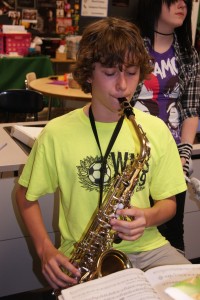Surviving Poets – for the first time ever we have had a tie on Poetry Island. In Mrs. Scales’ 1st period class, Edward Lear and Edgar Allen Poe tied as surviving poets on Poetry Island. The 2nd period surviving poet was Walt Whitman, 3rd and 4th periods were both Emily Dickinson.


All of the groups did a wonderful job representing their poets this week. The poets covered in each period were:
1st Period
Dickinson
Lear
Shakespeare
Poe
2nd Period
Browning
Cummings
Dickinson
Poe
Frost
Whitman
3rd Period
Cummings
Frost
Shakespeare
Poe
Dickinson
4th Period
Shakespeare
Whitman
Dickinson
Poe
Lear
Browning
During our Poetry Island celebration Mrs. Scales read “The Fish” by Elizabeth Bishop. Mrs. Scales admitted that she wasn’t very good at writing original poetry but she really liked poetry appreciation classes in college. “The Fish” is one of Bishop’s poems that has stuck with her over the years because it is so vivid and has wonderful imagery throughout. Bishop, like many of us goes fishing either for the pleasure of the activity, or maybe because she wants to eat some fresh fish, however she changes her mind because of the condition of the fish she catches. Mrs. Scales likes how through personification and descriptive reflection the poet demonstrates the change in how she feels towards the fish.
I caught a tremendous fish
and held him beside the boat
half out of water, with my hook
fast in a corner of his mouth.
He didn’t fight.
He hadn’t fought at all.
He hung a grunting weight,
battered and venerable
and homely. Here and there
his brown skin hung in strips
like ancient wallpaper,
and its pattern of darker brown
was like wallpaper:
shapes like full-blown roses
stained and lost through age.
He was speckled with barnacles,
fine rosettes of lime,
and infested
with tiny white sea-lice,
and underneath two or three
rags of green weed hung down.
While his gills were breathing in
the terrible oxygen
–the frightening gills,
fresh and crisp with blood,
that can cut so badly–
I thought of the coarse white flesh
packed in like feathers,
the big bones and the little bones,
the dramatic reds and blacks
of his shiny entrails,
and the pink swim-bladder
like a big peony.
I looked into his eyes
which were far larger than mine
but shallower, and yellowed,
the irises backed and packed
with tarnished tinfoil
seen through the lenses
of old scratched isinglass.
They shifted a little, but not
to return my stare.
–It was more like the tipping
of an object toward the light.
I admired his sullen face,
the mechanism of his jaw,
and then I saw
that from his lower lip
–if you could call it a lip
grim, wet, and weaponlike,
hung five old pieces of fish-line,
or four and a wire leader
with the swivel still attached,
with all their five big hooks
grown firmly in his mouth.
A green line, frayed at the end
where he broke it, two heavier lines,
and a fine black thread
still crimped from the strain and snap
when it broke and he got away.
Like medals with their ribbons
frayed and wavering,
a five-haired beard of wisdom
trailing from his aching jaw.
I stared and stared
and victory filled up
the little rented boat,
from the pool of bilge
where oil had spread a rainbow
around the rusted engine
to the bailer rusted orange,
the sun-cracked thwarts,
the oarlocks on their strings,
the gunnels–until everything
was rainbow, rainbow, rainbow!
And I let the fish go.
After finishing the Poetry Island celebration the final essay writing assignment was reviewed again and discussed further. Today we focused on making sure we read all of the instructions completely and how to use the rubric. It was explained that this is a lengthy assignment that will take most students three hours or more to complete. All of the five steps of writing will be used: Pre writing (notes from W-R’s notebook), Draft (write the essay), Revision (read the draft and make the big changes, add more, rearrange, take stuff out), Edit (read again and fix convention errors), Publish.
After the editing stage each student will still need to read their essay at least six more, separate times. This is where the rubric comes in. Looking at one writing trait at a time, read the essay and make notes on the rubric for that specific trait. For example in the word choice section of the rubric a score of five is determined by having picked just the right words to express your ideas and feeling about each poet. Every word seems exactly right, especially for each poet. We used examples as a class for what the means, such as words for Poe might be scary or dark, Gothic sounding words, while words for Lear would be much more whimsical and playful sounding. In after reading the final draft of the essay for word choice “some slang words” are found, a note needs to be made on the rubric and the essay revised to bring that score up to the 5 point box. The rubric is not just used as a scoring sheet, but rather to show the writer what needs to be improved upon in their essay. There are six writing traits on the rubric that need to be evaluated with notes taken on the rubric and revisions made to the essay before turning the essay and rubric in on Monday.
Today each period was given another 20 to 30 minutes of class time or more to work on the essay assignment. Mrs. Scales said this was important work time to have in class to get a good solid start on the assignment because she was right here where we could ask any questions we needed. She also reminded us that if we have questions over the weekend while we are working on the assignment we could use our assignment instructions handout, our rubric or read the blog entries from this week. If all else failed and we really needed her help, she said she is fine with us calling her at home.


